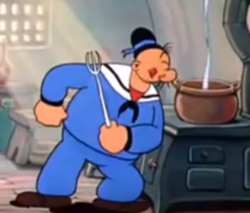
Olive Oyl is a cartoon character created by E. C. Segar in 1919 for his comic strip Thimble Theatre. The strip was later renamed Popeye after the sailor character that became the most popular member of the cast; however, Olive Oyl was a main character for a decade before Popeye's 1929 appearance.

Bluto, at times known as Brutus, is a cartoon and comics character created in 1932 by Elzie Crisler Segar as a one-time character, named "Bluto the Terrible", in his Thimble Theatre comic strip. Bluto made his first appearance on September 12 of that year. Fleischer Studios adapted him the next year (1933) to be the main antagonist of their theatrical Popeye animated cartoon series.

Elzie Crisler Segar, known by the pen name E. C. Segar, was an American cartoonist best known as the creator of Popeye, a pop culture character who first appeared in 1929 in Segar's comic strip Thimble Theatre.

Popeye is a 1982 platform game developed and released by Nintendo as an arcade video game. It is based on the comic strip of the same name created by E. C. Segar and licensed from King Features Syndicate. Some sources claim that Ikegami Tsushinki did programming work on the game. As Popeye, the player must collect hearts thrown by Olive Oyl from the top of the screen while being chased by Bluto. Popeye can punch bottles thrown at him, but can only hurt Bluto after eating the one can of spinach present in each level. Unlike Nintendo's earlier Donkey Kong games, there is no jump button. There are three screens.
See also: 1920s in comics, other events of the 1930s, 1940s in comics and the list of years in comics
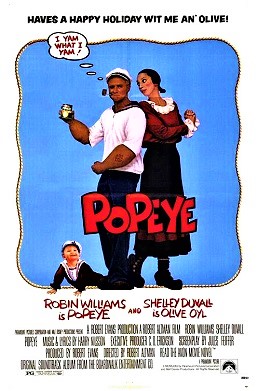
Popeye is a 1980 American musical comedy film directed by Robert Altman and produced by Paramount Pictures and Walt Disney Productions. It is based on E. C. Segar's Popeye comics character. The script was written by Jules Feiffer, and stars Robin Williams as Popeye the Sailor Man and Shelley Duvall as Olive Oyl. Its story follows Popeye's adventures as he arrives in the town of Sweethaven.

Popeye the Sailor Meets Sindbad the Sailor is a 1936 two-reel animated cartoon short subject in the Popeye Color Specials series, produced in Technicolor and released to theatres on November 27, 1936, by Paramount Pictures. It was produced by Max Fleischer for Fleischer Studios and directed by Dave Fleischer, with the title song's music composed by Sammy Timberg and lyrics written by Bob Rothberg. The voice cast includes Jack Mercer as Popeye, Gus Wickie as Sindbad the Sailor, Mae Questel as Olive Oyl and Lou Fleischer as J. Wellington Wimpy.

Popeye the Sailor Meets Ali Baba's Forty Thieves is a two-reel animated cartoon short subject in the Popeye Color Specials series, produced in Technicolor and released to theatres on November 26, 1937 by Paramount Pictures. It was produced by Max Fleischer for Fleischer Studios, Inc. and directed by Dave Fleischer. Willard Bowsky was head animator, with musical supervision by Sammy Timberg. The voice of Popeye is performed by Jack Mercer, with additional voices by Mae Questel as Olive Oyl, Lou Fleischer as J. Wellington Wimpy and Gus Wickie as Abu Hassan.
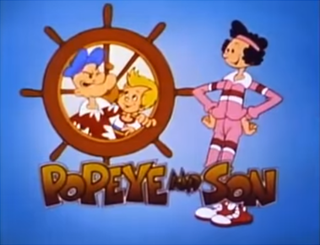
Popeye and Son is an American animated comedy series based on the Popeye comic strip created by E.C. Segar and published by King Features Syndicate. Jointly produced by Hanna-Barbera and King Features subsidiary King Features Entertainment, the series aired for one season of thirteen episodes on CBS. It is a follow-up to The All New Popeye Hour. Due to Jack Mercer's death in 1984, Maurice LaMarche voiced Popeye, while much of the cast of The All New Popeye Hour reprised their respective roles, with the exception of Daws Butler. However, Nancy Cartwright, who was trained by Butler, voiced Woody in the series.

Popeye's Voyage: The Quest for Pappy is a 2004 animated Christmas television special produced by Mainframe Entertainment for Lions Gate Entertainment and King Features Entertainment, in association with Nuance Productions. The special, created to coincide with the 75th anniversary of the Popeye the Sailor comic strip character from E. C. Segar's Thimble Theatre, first aired on Fox on December 17, 2004, and was rebroadcast on the same network on December 30, 2005.
Alice the Goon is a fictional character in E. C. Segar's comic strip Thimble Theatre and in the Popeye cartoon series derived from it.
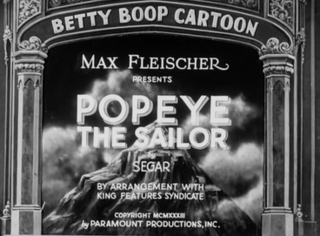
Popeye the Sailor is a 1933 animated short produced by Fleischer Studios and distributed by Paramount Publix Corporation. While billed as a Betty Boop cartoon, it was produced as a vehicle for Popeye in his debut animated appearance.

I Yam What I Yam is the second Popeye theatrical cartoon short, starring William "Billy" Costello as Popeye, Bonnie Poe as Olive Oyl and Charles Lawrence as Wimpy. The source of the quote is the comic strip, Thimble Theatre by E. C. Segar, in which Popeye first appeared. This is a paraphrase of words spoken by Popeye in the comic strip.
George W. Geezil, also known as simply Geezil, is a comic strip character created by E. C. Segar for his strip Thimble Theatre in 1932.
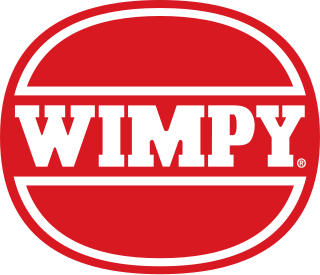
Wimpy is a fast-food chain that was founded in the United States. It found its success internationally, mainly in the United Kingdom and South Africa. It has changed between being a table-service establishment and counter-service establishment throughout its history.
Popeye Meets the Man Who Hated Laughter, also known as The Man Who Hated Laughter, is a 1972 American animated one-hour television special that was part of The ABC Saturday Superstar Movie. This film united characters from almost every newspaper comic strip then owned by King Features Syndicate in one story. The show aired on October 7, 1972, and was repeated in February 1974.

The Sea Hag is a fictional character owned by King Features Syndicate. She is a tall, masculine-looking witch featured in comics/cartoons as a nemesis to the character Popeye. The Sea Hag was created by Elzie Crisler Segar in 1929 as part of the Thimble Theatre comic strip.

Popeye the Sailor is a fictional cartoon character created by Elzie Crisler Segar. The character first appeared on January 17, 1929, in the daily King Features comic strip Thimble Theatre. The strip was in its tenth year when Popeye made his debut, but the one-eyed sailor quickly became the lead character, and Thimble Theatre became one of King Features' most popular properties during the 1930s. Following Segar's death in 1938, Thimble Theatre was continued by several writers and artists, most notably Segar's assistant Bud Sagendorf. The strip continues to appear in first-run installments on Sundays, written and drawn by R. K. Milholland. The daily strips are reprints of old Sagendorf stories.
Notable events of 1932 in comics.
